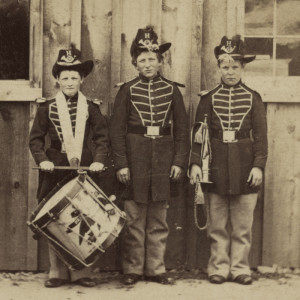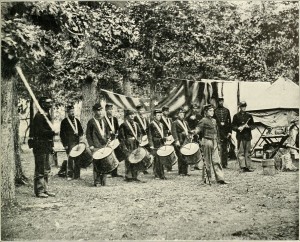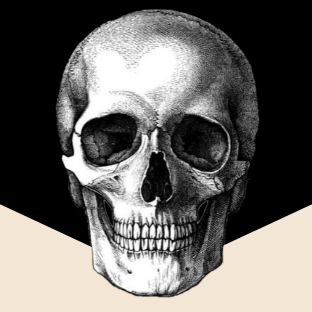
Thirteen-year-old Charley King was the youngest soldier killed in the war. Orion Howe received a Medal of Honor for the bravery he displayed, also at age thirteen. William Horsfall was not more than fifteen when he rescued his wounded captain and he, too, received a Medal of Honor for his heroism.1
All three were drummer boys in the American Civil War.
For centuries, drums were used in wartime. Their low tones could be heard in battle and distinct rhythms were used to represent the various orders conveyed by the commanding officers. During the Civil War, approximately forty different beats were employed, not only during combat, but also to structure the soldiers’ everyday life. They announced the time for camp duties, meals, and formations. They boosted morale, made marches more orderly, and intimidated the opposition.2
The average age of drummers in the Civil War was eighteen. Those younger than fourteen were often sons accompanying their fathers or orphans. The youngest known drummer boy, one of approximately 200 drummers during the American Revolution, was only seven years old.3
Over time, the explosions of warfare grew louder and more frequent, due to advances in artillery design. Drum rolls gave way to the higher pitch of bugles as a more effective means of communication on booming battlefields. But drums remain a significant feature of military life. The thought of a young patriot, bearing the weight of a big drum, still captures the imagination.4
*****

The week and a half before Memorial Day of 2016, I caught the words, “Department of Defense” and “Pentagon,” on a jacket worn by a gentleman in a waiting room. I took a seat next to him and inquired. His son, who works at the Pentagon, had sent the jacket to him last year for Father’s Day. We chatted, sharing the general details of our diagnoses. He told me, matter-of-factly, “My prostate cancer was a gift from Uncle Sam. Vietnam. Something called Agent Orange.”
I asked if he had any thoughts about drums in the military. “No,” he replied, “I can’t say anything about that. But I was at a Coast Guard award ceremony last night,” he went on. “There was a band. The cadets played and the drums. . . , they get me.” His upturned hand, closing and pressing into his gut, was a brief gesture. “But I can’t say anything about that,” he repeated.
Reference
1.Elizabeth M. Collins, “The Beats of Battle: Images of Army Drummer Boys Endure,” Soldiers: The Official U.S. Army Magazine, December 22, 2013, accessed May 19, 2016. http://soldiers.dodlive.mil/2013/12/the-beats-of-battle-images-of-army-drummer-boys-endure/
2. ibid.
3. ibid.
4. ibid.
Catherine D’Andrea
Blog Editor
